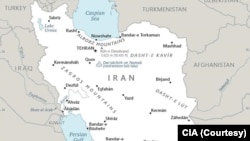
A Friday report by the United Nations says Iran is using advanced technology, including drones, facial recognition and a citizen-reporting app to crack down on violations of its mandatory hijab laws.
A key element of the effort is the government-backed Nazer app, which enables the police and "vetted" members of the public to report alleged violations by women in vehicles, including those in ambulances, mass transit and taxis.
The report describes the app as allowing users to upload the vehicle license plate, location and time of an alleged violation. It then, according to the report, alerts police. Then, according to the report, the app "triggers a text message (in real-time) to the registered owner of the vehicle, warning them that they had been found in violation of the mandatory hijab laws, and that their vehicles would be impounded for ignoring these warnings."
According to the report, authorities are using drones in Tehran and the southern part of the country to monitor hijab compliance in public areas, as well as new facial recognition software said to have been installed last year at the entrance of Tehran’s Amirkabir University.
The report is to go to the U.N. Human Rights Council on Tuesday.







